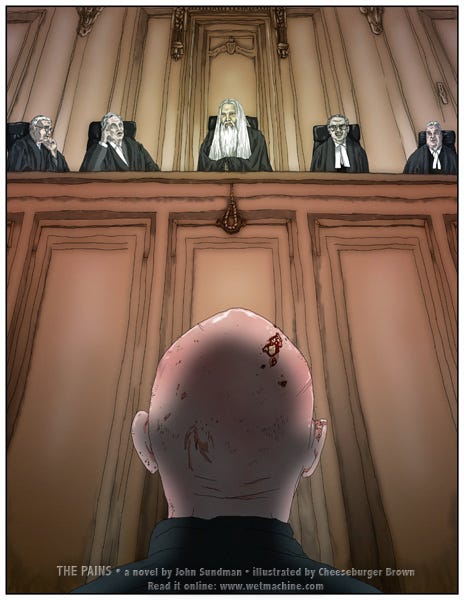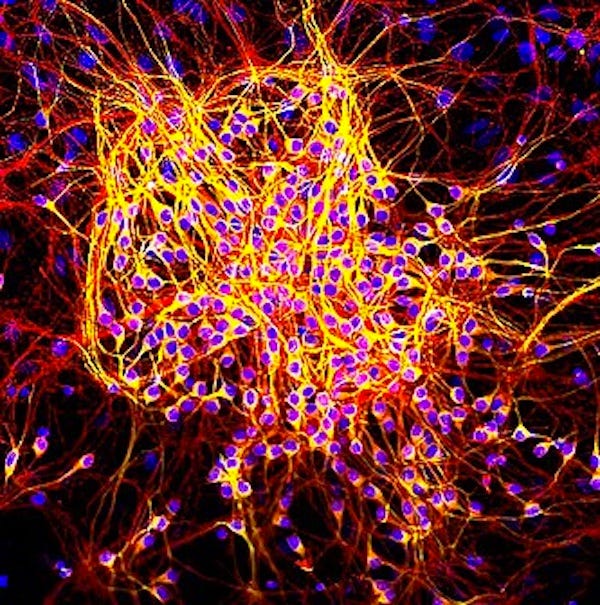Entanglement
Ironies and incongruities
Wire hazard
When ceilings collapse as buildings burn, sometimes they drop a big mess of tangled wires. If you are a firefighter underneath a collapsing ceiling you may find yourself entangled. It’s especially tricky if wires get caught on the airpack on your back. The valve that turns your air supply on or off is the most problematic part.
A sunny, cool, autumn day. Perfect for today’s class. Our subject? Rescuing trapped firefighters before the air in their air packs runs out, and they die. We shall start with self-rescue.
Instructors from the Firefighting Academy have brought their wire hazard prop; it’s in the parking lot behind the firehouse. Each firefighter in turn must make their way through it. The guy before you has just failed to make it through before his ‘low air’ alarm sounded. Ooops, so sad. Another imaginary LODD, line-of-duty-death. Better luck next time. Instructors untangle him. Now it’s your turn.
Incongruous dike
In 1975, near the town of N’Dioum, along the southern bank of Doué (a tributary to the Senegal River), the government of Senegal, with the help of the World Bank and under the auspices of the Food and Agricultural Organization of the United Nations, built an irrigated farm of 590 hectares (1,458 acres), called Nianga.
At one corner of the farm there were a bunch of buildings, including a few houses, a garage, a pump house, some warehouses, and a power station that supplied electricity from sunup to midnight every day.
The entire farm — fields, canals, farm implements (some mechanized, other human-powered), the small compound of buildings — was surrounded by an earthen dike about 15 feet high and wide enough, at the top, to drive a Deux Chevaux breadwagon on.
The first time you approach Nianga Farm, if it happens to be during the dry season, the dike, looming up in the arid distance, strikes you as being quite out of place. Northern Senegal is in the Sahel, which, when not in the wet season, looks like the fringe of the Sahara Desert, which it is. It basically looks like a giant sandbox with a few scrubby bushes or trees here and there. It almost looks like Arrakis. There is no water anywhere, unless you count the Doré, a very unthreatening-looking river. So why is there a dike there? It’s incongruous.
The 2022 Nobel Prize for Physics
As discussed, I do not understand cosmology. It goes without saying that I also do not understand quantum mechanics, for as the legendary genius physicist (and, according to some people (evidently including one ex-wife), misogynistic jerk) Richard Feynman said, ‘Anybody who says they understand quantum mechanics doesn’t understand quantum mechanics.’
The converse to that statement (i.e. that anybody who claims they do not understand quantum mechanics does understand quantum mechanics) is not true, by the way — as may have been proved by Kurt Gödel, the logician of mathematics known for his ontological proof of the existence of God, which in many ways resembles that of Duns Scotus, the Scottish Franciscan friar and philosopher (c. 1265/66–1308).
Entanglement is a key concept in quantum mechanics and also in cosmology. For example, consider the so-called Hawking Paradox, when one particle of an entangled pair falls into a black hole while its companion particle radiates who knows where.
If you want to understand what ‘entanglement’ means in the context of quantum mechanics, I suggest you go on the internet and watch some videos by Leonard Susskind, a physicist at Stanford university. He will give a very understandable explanation of entanglement which, after 60 minutes will get you to the conclusion, where he says, “I don’t understand this, I don’t think anybody does.” Or if he didn’t say that I like to imagine that he did, because I most certainly had become completely befuddled.
Quantum entanglement was the subject of some thought experiments by the Irish physicist John Bell, in which he demonstrated some paradoxes about the nature of reality, and in 2022 the Nobel Prize in Physics was awarded to some very smart gentlemen who devised some very clever experiments that proved, using entanglement, that Dr. Bell was correct and reality does not really exist.
But what about quantum computers? Doesn’t entanglement have something to do with them? Good question. I highly recommend this video from IBM, featuring Olivia Lanes, which explains in a very non-poindexterian way, how these two concepts — entanglement and quantum computing — are related. Which, if you can explain it to a five year old after watching this video you’re a much more clever monkey than I.
On air, in the dark
The instructors from the Firefighting Academy swing open the top gate. Your usual face mask has been replaced with a training mask, which is covered with duct tape so you can’t see through it. “OK, on air,” the instructors say. Even though you can’t see a thing, you connect the air supply tube to your face mask & reach behind your back to turn on the air. “Crawl in and lie down.” You do. The gate swings down with a loud crash. Through your heavy turnout gear you feel the wires falling all over you.
Harold Feld, Wetmachine, 2006
In 2003 I started a blog that I called Wetmachine and invited friends and acquaintances to blog with me. Over the 15 or so years that Wetmachine was most active we wrote about all kinds of things — thousands of posts — which this margin does not have space for me to go into but which I will surely revisit at some point. Over these years Harold Feld, an attorney who specializes in First Amendment, FCC, FTC law became Wetmachine’s most prominent writer. He usually wrote about law and policy, but in January, 2006 he took a slight detour to make this observation.
Back in the mid-1990s, it amused me no end to see know-it-alls pound on [TV Show Babylon 5 series creator] J. Michael Straczinsky for the ridiculous idea that the government could shift from democratic to essentially a military dictatorship in so short a time, simply by leveraging the fear of “alien influences” assaulting our “way of life.” “Ho ho ho,” they laughed. “That trick may work on others, but it couldn’t happen in a real democracy like the U.S. I mean, if the President started to intrude on people’s rights and civil liberties, started locking them up and holding them for years without pressing charges, or started spying on his own people, no one would sit still for it! He’d be out on his ear when everyone rose up in protest.”
Sadly, I think JMS may end up with the last laugh, although I doubt he will find saying “told ya so” much comfort.
461 Ocean Boulevard, April - May 1974
In recent months I have frequently had in my head the Eric Clapton version of the traditional blues song Motherless Children, first recorded as Motherless Children Have a Hard Time by Blind Willie Johnson in 1927.
Motherless children have a hard time when mother is dead, lord. Motherless children have a hard time when mother is dead, lord. They don't have anywhere to go; Wandering around from door to door. Nobody treats you like a mother will when your mother is dead, lord.
This song appears on Clapton’s album 461 Ocean Boulevard, which was recorded, according to Wikipedia, in April and May, 1974, fifty years before I write this essay — the very same month that the Rolling Stones were recording their song Time Waits for No One.
As discussed in the two-post series Jerrycans full of gasoline in the back seat, April - May 1974 was a period in my life of epochal consequence.
Clapton’s version1 is upbeat; indeed, it is joyful. Many listeners find the disjunction between the music and sung words to be very disturbing. When I tried to show my wife my favorite performance (Clapton & his band in San Diego, 2005) she took her headphones off after the first verse, saying, “I can’t listen to this.”
Father will do the best he can when your mother is dead, lord Father will do the best he can when your mother is dead, lord Father will do the best he can So many things a father can't understand Nobody treats you like a mother will when your mother is dead, lord.
How can one be joyful singing about motherless children? It’s incongruous.
Like Gulliver, pinned down by Lilliputians
You’re in the dark, the only sound is your breathing, amplified by the face mask. You’re vaguely aware the you’re perfectly safe in a firehouse parking lot, but your racing heart somehow didn’t get the message. You know what you’re supposed to do: first, call in a ‘mayday’ on your radio, explaining where you are, and that wires have fallen on you. Then, gently release your self from any wires. Then roll over on your back and push yourself forward, sliding on your air bottle.
You reach for your radio in the pocket above your heart to issue a mayday, to call for help. But find that your hand is caught in wires. You are entangled.
The blinding of Blind Willie Johnson and Clapton’s ironies
According to Wikipedia,
“The lyrics [to ‘Motherless children have a hard time’] are autobiographical, since Johnson's mother died when he was young. His father remarried soon after her death, and later, the stepmother allegedly threw a caustic solution, which blinded the boy.”
Johnson’s version of the song is, perhaps surprisingly, nearly as uptempo as Clapton’s is. Although Clapton’s version has a totally different feeling from Johnson’s, if you listen closely you can hear Johnson riffs that Clapton repurposed in his version — particularly the slide guitar parts.
I know that Clapton has many detractors. He’s a man of many contradictions, evidently. Some listeners hear the Clapton/Raddle arrangement of Motherless Children as ironic, or glib, as if making a joke about orphaned children.
I don’t hear it that way. I find it very moving. I never hear this song without thinking of poor orphaned children with nowhere to go, wandering around from door to door. It is incongruous but not ironic.
That’s all I have to say about that.
The terror of knowing what this world is about, a brief update
In my most recent Sundman figures it out! essay, more than three long weeks ago now, I wrote how a years-long series of vicissitudes had brought me to a place of great financial peril at the same time that my wife was hospitalized with a serious illness. Having failed in various attempts to secure a loan or loans, embarrassed, I launched a GoFundMe campaign, with a target goal so high that I did not expect to reach it, hoping to get maybe half of what I asked for.
By a kind of personal Dunkirk Financial Miracle within 48 hours my goal had been reached and surpassed through the generous contributions of more than 150 people, including several readers of this very gazette. It was a life-saving and unexpected development which left me shaking with relief, gratitude and humility. I shall file it in my memory under the heading ‘The wonder of knowing what this world is about.’ So many people are so wonderful to me. Evidently our lives are entangled.
My wife spent nearly three weeks in hospitals battling a scary pneumonia but she is home now, recuperating. And I am contemplating the irony of how being turned down for loans I so desperately sought opened the door to this miracle, this great connection and liberation from entangling debt.
Meaning to write but curiously unable to do so
I had a postcard once2 on which there was a black and white illustration of a table with a pen and blank piece of paper on it, and, in a corner at the other side of the room, a man crouching in fear.
Most writers have dealt with that ‘writer’s block’ kind of thing; I most assuredly have, although a good part of me thinks that ‘writer’s block’ is bullshit. These last few weeks have been very trying for me. Everywhere I look I see fascist theocrats making common cause with libertarian transhumanist pan-surveillant capitalists; students being clubbed; newsmedia focusing on bullshit.

I have Harold Feld’s comments about Babylon 5 on my mind a lot these days. And I ponder the utility of art.
I find myself thinking of orphans created by state violence. Children ripped from their mother’s arms at the US/Mexico border by agents of my country, the United States. Orphans in Gaza, in Ukraine, in Mexico, Guatemala, El Salvador, Israel, Senegal, Iran, Syria, Nigeria, Sri Lanka, Rwanda, Guyana . . heck, in every blesséd country on earth. Motherless children everywhere.
How, in this context, shall I write one of my glib interwoven Sundman figures it out! posts? I like to call myself a writer, an essayist, a novelist. What am I supposed to be writing now? What can I say that is worthy of where we find ourselves?
The Tau of Pynchon
Somewhere in Thomas Pynchon’s entropic masterpiece Gravity’s Rainbow is the line
“It is not an unravelling, but a knotting into.”3
In other words, an entanglement. Gravity’s Rainbow was published in 1974. At that time was it wasn’t widely known that tangles of tau4 protein were implicated in dementia since that result wasn’t published until 1975:
Pathologies and dementias of the nervous system such as Alzheimer's disease and Parkinson's disease are associated with tau proteins that have become hyperphosphorylated insoluble aggregates called neurofibrillary tangles. The tau proteins were identified in 1975 as heat-stable proteins essential for microtubule assembly, and since then they have been characterized as intrinsically disordered proteins.

As I tried to explain in my essay Easy Was, within and between my Sundman figures it out! posts I am trying to weave some kind of tapestry. However sometimes my thoughts and threads get so jumbled that I just get an insoluble tangle.5
Notes on the ontological arguments for the existence of God from Duns Scotus and Kurt Gödel
From Wikipedia:
Duns Scotus:
Duns Scotus has had considerable influence on both Catholic and secular thought. The doctrines for which he is best known are the "univocity of being", that existence is the most abstract concept we have, applicable to everything that exists; the formal distinction, a way of distinguishing between different formalities of the same thing; and the idea of haecceity, the property supposed to be in each individual thing that makes it an individual (i.e. a certain “thisness”).
Kurt Gödel:
To this end, [Gödel] defines essences: if x is an object in some world, then a property φ is said to be an essence of x if φ(x) is true in that world and if φ necessarily entails all other properties that x has in that world (definition 2). Requiring positive properties being positive in every possible world (axiom 4), Gödel can show that Godlikeness is an essence of a Godlike object (theorem 3). Now, x is said to exist necessarily if, for every essence φ of x, there is an element y with property φ in every possible world (definition 3). Axiom 5 requires necessary existence to be a positive property.
‘Motherless Children’ at Nianga Farm
There is no room in this margin to tell what I saw, and felt, and learned in the eight months I spent at Nianga Farm starting in January, 1978. That was a time when the universe was still in flux, perhaps due to the collision of two neutron stars, as described in my Jerrycans filled with gasoline in the back seat essays.
But for you to have an inkling of what I might have felt the first time I saw that dike rising up in the distance before me as I drove my little Deux Cevaux breadwagon down the corduroyed dirt road in the arid Sahelian heat I gently suggest that you read (or reread?) my essay Dark side of the hut, fifty years later, about the nearly two years I spent living in the small village of Fanaye Dieri forty kilometers downstream, on the bank of the Doué river.
At Nianga Farm there was kind of ‘community’ center, a forlorn place, and that’s where my room was. In a small dusty common room of this ‘center’ there was a refrigerator (which hummed during the 16 hours each day that there was electricity at Nianga) which sometimes contained a few bottles of Stork beer. After a long day interviewing the women and men who worked those hot fields, I would retire to my lonely room. Perhaps I would get a beer from the fridge, maybe grab some light reading. There was a record player there, and three albums for me to chose from: Orchestra Baobab; Exodus, by Bob Marley, and 461 Ocean Boulevard, by Eric Clapton.
Credited to Clapton, Carl Raddle and Johnson/traditional
I think I may have posted it in a diary somewhere. I should see if I can find it. Someday, I suppose.
I don’t remember the antecedent of the word “it,’ but presumably it refers to our current reality in some way.
tubulin associated unit
Maybe I should ask my nephew Mark about this stuff. He’s a hotshot Alzheimers researcher who writes papers with titles like Cortical excitability and plasticity in Alzheimer's disease and mild cognitive impairment: A systematic review and meta-analysis of transcranial magnetic stimulation studies.






I encountered Steve Miller's version of "Motherless Children". It's much better - Glyn John's production is excellent. Clapton's version is closer to the original lyrically, but I'm one of those who find it simply incongruous. (I prefer Clapton when he shuts up and let's someone else sing, like Jack Bruce, George Harrison, or J. J. Cale. )
https://youtu.be/SOtuQQJiG68?si=2TDjshhymU3yOgc_
Excellent post, very GEB! Glad to hear Betty's doing better.